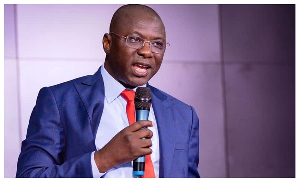Accra, March 30, GNA - Mr Tony Oteng-Gyasi, a former President of the Association of Ghana Industries, has suggested that every adult Ghanaian be taxed a small amount towards a fund for financing political parties and processes of political change.
This, he noted, would end the dependence on foreign funds, which he said brought undue influence on the beneficiaries.
Mr Oteng-Gyasi, also Managing Director of Tropical Cables and Conducto= r Limited, gave the suggestion when he delivered a lecture on the theme: "Financiers of Political Change in Ghana; Heroes and Villains?" at the Institute of African Studies (IAS), University of Ghana. He stated that although some Ghanaians claim that national development was derailed by the foreign financing of the overthrow of Osagyefo Dr Kwame Nkrumah, the country's laws allow and actively encourage foreign financin= g of political activity.
Expenditure on political party and processes must also be reduced to make them bearable, Mr Oteng-Gyasi advised.
"Apart from the undue influence foreign financing gives to non-citizens, it is dangerous to hinge our democracy on the generosity of foreigners, as was forcefully brought to us during the recent District Leve= l Elections when the expected foreign funding did not come as scheduled," h= e said. The lecture is the second in a series on Business in Africa, organised by IAS, in collaboration with AngloGold Ashanti Ghana limited. Under Article 55 of the 1992 Constitution, political parties are required by law to declare to the public their revenue and assets as well a= s their sources and to publish annually their audited accounts. It also state= s that only a 93citizen" of Ghana can make a contribution or donation to a political party registered in Ghana.
The Political Parties Act of 2000, Act 574, notes that the contributio= n may be in cash or kind but expands the definition of 93citizen" to inclu= de corporate citizen, which it defines as 93a firm, partnership or enterprise owned by a citizen or a company registered under the laws of the Republic a= t least 75 per cent of whose capital is owned by a citizen."
Mr Oteng-Gyasi, who is also a lawyer, said this Act gave the opportunity to foreigners by the definition of a citizen and for not insisting on 100 per cent ownership by a Ghanaian.
"It is my considered opinion that the definition of corporate citize= n in Act 574 section 23(2) is at variance with the constitution. I do not think it would stand if challenged in the Supreme Court." He attributed the conflicting nature of the laws to the lack of confidence of Ghanaians in their ability to finance the expensive business of multi-party democracy, which they had chosen. This, he said, was demonstrated in section 25(3) of Act 572, which allowed any country or non-governmental organisation to provide assistance in cash or kind to the Electoral Commission for the collective benefit of registered political parties.
He noted that although several Ghanaian businessmen, including Mr William N. Ocansey, Mr Isaac Pupulampu, Mr John K. Ayew, Mr Winifred Tetteh-Ansah and Mr George Alfred Grant (Paa Grant) had been financiers of politics in pre-colonial, colonial and post-independence eras in the histor= y of Ghana, individual owner-based private sector was discouraged after independence.
Mr Oteng-Gyasi said Ghana's dependence on foreign finance seemed to have come about as a result of Nkrumah's discomfort with the idea of a tr= uly indigenous private sector probably due to his experiences as a black man in a racist era in America.
General News of Wednesday, 30 March 2011
Source: GNA
















